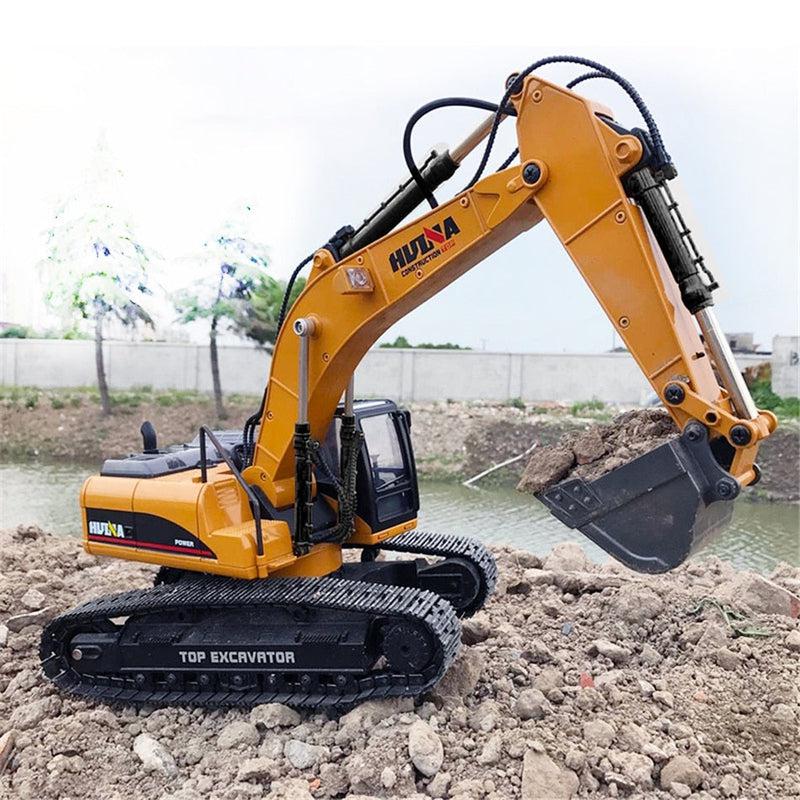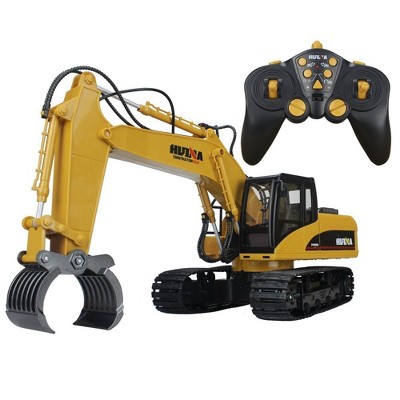Recognizing Exactly How Excavator Functions and Its Influence On Efficiency
Excavators play a vital role in building and mining operations, depending on an intricate interaction of hydraulic and mechanical systems. Their capacity to perform a range of tasks depends upon both their layout and the technology integrated within. Understanding these components can greatly affect functional efficiency and productivity. As advancements remain to reshape the sector, one should consider just how these adjustments will influence future techniques and performance.
The Essentials of Excavator Mechanics

The Duty of Hydraulic Systems in Excavators
At the heart of excavator procedure lies the hydraulic system, which plays an essential role in powering the device's features and movements. This system utilizes pressurized hydraulic liquid to move energy, allowing numerous actions such as digging, training, and swinging. By taking advantage of the principles of hydraulics, excavators can carry out jobs with impressive accuracy and force, improving total operational efficiency.The hydraulic system includes key components, including shutoffs, pumps, and cylinders, which interact to control the flow and instructions of the liquid. When the operator involves the controls, the hydraulic liquid is guided to particular cylinders, equating the operator's commands into physical movement. This mechanism permits smooth and responsive activities, which are vital in building and excavation atmospheres. double e volvo rc excavator. The efficiency of the hydraulic system straight influences the performance and adaptability of the excavator, making it an essential element in contemporary excavation processes
Key Parts of an Excavator
Understanding the vital elements of an excavator is crucial for grasping how this powerful device operates. An excavator includes numerous substantial components, consisting of the undercarriage, residence, arm, boom, and pail. The undercarriage supplies security and flexibility, often featuring tracks or wheels to browse various surfaces. The residence contains the engine and hydraulic systems, allowing the driver to manage motion and power the device. The boom extends from the residence, allowing upright reach, while the arm attaches to the pail, facilitating excavating and training operations.Additionally, the taxi houses the operator, equipped with controls for specific handling. Each of these elements plays an important function in the excavator's overall performance, adding to its effectiveness and effectiveness on building websites. Comprehending these parts helps in keeping and enhancing excavator performance, guaranteeing jobs are completed safely and efficiently.
Accessory Versatility and Its Benefits
Accessory adaptability is a vital facet of excavators, enabling operators to change in between various tools customized for specific tasks. This adaptability not just improves task performance yet additionally adds to cost-effectiveness by lowering the demand for numerous equipments. Recognizing the various kinds of accessories offered can substantially influence the total efficiency and performance of an excavator on task sites.
Sorts of Add-ons
While excavators are primarily recognized for their digging capacities, their true flexibility depends on the broad variety of accessories offered. These accessories improve the excavator's performance, enabling it to do numerous tasks beyond excavation. Common accessories include containers (for excavating and scooping), hydraulic thumbs (for comprehending products), and augers (for piercing holes) Grapples are used for managing and moving debris, while rippers can damage up hard surface areas. Other specialized add-ons, such as plates and rakes, make it possible for excavators to adapt to particular task demands. This diversity not only enhances the maker's utility throughout various markets, consisting of demolition, building, and landscape design, yet additionally enables operators to tailor their devices to satisfy specific task demands efficiently.
Raised Work Efficiency
Optimizing work performance is a key benefit of utilizing various excavator attachments. Various attachments permit an excavator to do multiple jobs without needing to switch over equipment, saving valuable time and labor. Making use of a hydraulic hammer can break concrete while a bucket attachment can dig deep into soil, making it possible for a seamless operations. This adaptability reduces downtime related to equipment changes and improves efficiency on-site. In addition, specialized attachments improve precision in tasks such as grading or landscaping, resulting in better results. The capability to adjust to different work needs not only enhances procedures yet additionally lessens the requirement for added equipment, guaranteeing that jobs are completed quickly and efficiently. On the whole, add-on adaptability significantly adds to enhanced job effectiveness in excavation work.
Cost-Effectiveness and Adaptability
Cost-effectiveness is a considerable advantage of utilizing versatile excavator attachments. These add-ons permit a single excavator to carry out multiple jobs, lowering the demand for extra machinery and labor - double e volvo rc excavator. By switching over in between containers, hammers, and grapples, operators can take on different tasks, from excavating to demolition, therefore optimizing tools use. This versatility not only reduces operational costs yet likewise reduces downtime connected with changing tools. In addition, the capacity to tailor excavators with specialized add-ons boosts productivity, as they can efficiently deal with varied jobs according to task demands. In conclusion, the combination of cost-effectiveness and flexibility in excavator add-ons adds to improved operational efficiency and resource allowance in construction and excavation projects

Advanced Technology in Modern Excavators
Modern excavators are significantly furnished with sophisticated innovation that changes excavation procedures. Automation improves procedures, while boosted fuel efficiency lowers operational costs. In addition, wise control systems improve accuracy and security, noting a substantial development in excavation devices.
Automation in Excavation Processes
As excavation technology advances, automation has become a critical element in enhancing performance and precision on job websites. Modern excavators are equipped with innovative automated systems that help with jobs such as grading, digging, and trenching with very little driver intervention. These systems make use of sensors, GPS, and artificial intelligence formulas to ensure exact positioning and depth control, substantially decreasing the margin for mistake. Additionally, automation permits operators to concentrate on critical decision-making instead of hands-on controls, leading to boosted productivity generally. Such innovations not just simplify workflows yet additionally enhance safety by decreasing human mistake in complex procedures. Subsequently, the integration of automation in excavation processes stands for a considerable improvement in building and construction technology, driving the industry towards higher effectiveness and performance.
Enhanced Fuel Efficiency
Developments in innovation have likewise caused substantial renovations in gas performance for modern excavators. Modern equipments are outfitted with advanced engines that optimize power result while reducing gas intake. These engines make use of cutting-edge burning innovations, such as turbocharging and direct fuel injection, to enhance efficiency and performance. Furthermore, light-weight products in building and construction reduce overall weight, permitting less power expense Bonuses throughout procedure. The intro of variable rate controls makes it possible for drivers to change engine performance according to specific jobs, better lessening fuel usage. Therefore, these enhancements not only reduced functional expenses however also add to environmental sustainability by lowering emissions. Overall, improved fuel efficiency in excavators is a crucial development that reinforces efficiency and financial stability in the building and construction industry.
Smart Control Solution
While drivers navigate significantly complex work websites, smart control systems in excavators have become important devices for improving efficiency and precision. These sophisticated technologies make use of sensing units and algorithms to check various parameters such as tons weight, terrain problems, and operational performance. By automatically readjusting hydraulic functions, clever systems optimize maker performance, resulting in boosted efficiency and minimized endure elements. Additionally, drivers profit from user-friendly interfaces that give real-time feedback and diagnostics, permitting for informed decision-making. This assimilation of innovation not only simplifies operations yet additionally minimizes human error, adding to much safer workplace. As the building sector remains to progress, smart control systems will certainly play an essential duty in forming the future of excavator effectiveness and effectiveness.
Enhancing Operational Efficiency With Excavators
Excavators play an essential duty in enhancing operational efficiency throughout numerous construction and excavation tasks. Their versatility permits several tasks, consisting of lifting, product, and excavating handling, which simplifies operations and lowers the requirement for added devices. With effective hydraulic systems, excavators can do sturdy tasks with precision, significantly decreasing the moment called for to complete jobs. The assimilation of advanced technology, such as general practitioner and automated controls, further maximizes their operation, enabling operators to attain higher accuracy and lower material waste. Furthermore, modern excavators are made to eat much less fuel and reduce discharges, adding to both price savings and environmental sustainability. By utilizing excavators properly, building and construction groups can enhance productivity, satisfy job deadlines, and enhance total site administration. This multifunctionality and performance make excavators essential tools in the modern-day building and construction landscape.
The Future of Excavators in Building And Construction and Mining Industries
As the building and mining markets advance, the future of excavators is poised for substantial transformation driven by technical advancement and transforming functional needs. Developments in automation and man-made intelligence are reshaping excavator capabilities, enabling improved accuracy and performance in procedures. Independent excavators are arising, decreasing the demand for human intervention and decreasing the threat of accidents.Moreover, the combination of telematics and IoT modern technology makes it possible for real-time surveillance of machine performance and anticipating maintenance, maximizing uptime. Eco-friendly designs, consisting of hybrid and electrical versions, are obtaining grip, aligning with sustainability goals within the industry.Additionally, making use of advanced materials and lighter designs enhances gas performance while keeping efficiency criteria. As these patterns progress, excavators will certainly play a vital duty in satisfying the enhancing demands for performance and safety and security in building and mining, eventually transforming functional landscapes.
Regularly Asked Inquiries
How Do Weather Problems Affect Excavator Performance?

Weather considerably influence excavator performance, as rain and mud can hinder traction and security, while extreme temperature levels might affect hydraulic systems. Operators has to adjust to these variables to guarantee optimal performance and safety during operations.
What Safety Actions Should Operators Adhere To While Using Excavators?
Safety and security actions for excavator operators include using proper individual safety devices, conducting pre-operation evaluations, guaranteeing correct interaction with ground personnel, maintaining a risk-free range from above dangers, and adhering to recognized operational procedures to prevent crashes.
Just How Frequently Should Excavators Be Maintained for Optimal Performance?
Excavators ought to be preserved routinely to ensure peak performance, generally every 250 operating hours or as defined by the manufacturer. Routine checks boost site web integrity, protect against unexpected breakdowns, and extend the life expectancy continue reading this of the equipment.
What Is the Average Life Expectancy of an Excavator?
The average life expectancy of an excavator usually ranges from 10,000 to 15,000 hours of procedure. Variables influencing longevity include maintenance practices, running problems, and the high quality of the equipment itself, impacting total productivity and effectiveness.

Can Excavators Run on Unequal Terrain Efficiently?
Excavators can run effectively on uneven terrain due to their articulated styles and flexible tracks. These functions allow them to preserve stability and traction, enabling effective operation in challenging environments generally experienced in building and landscape design jobs. Each of these components plays an essential function in the excavator's general performance, contributing to its performance and efficiency on building and construction sites. Making the most of work performance is a key benefit of making use of various excavator add-ons. While operators navigate progressively complicated job websites, wise control systems in excavators have emerged as vital tools for enhancing efficiency and accuracy. Excavators play a necessary function in improving operational effectiveness throughout numerous building and construction and excavation projects. Advances in automation and fabricated intelligence are improving excavator capabilities, allowing for enhanced accuracy and efficiency in procedures.